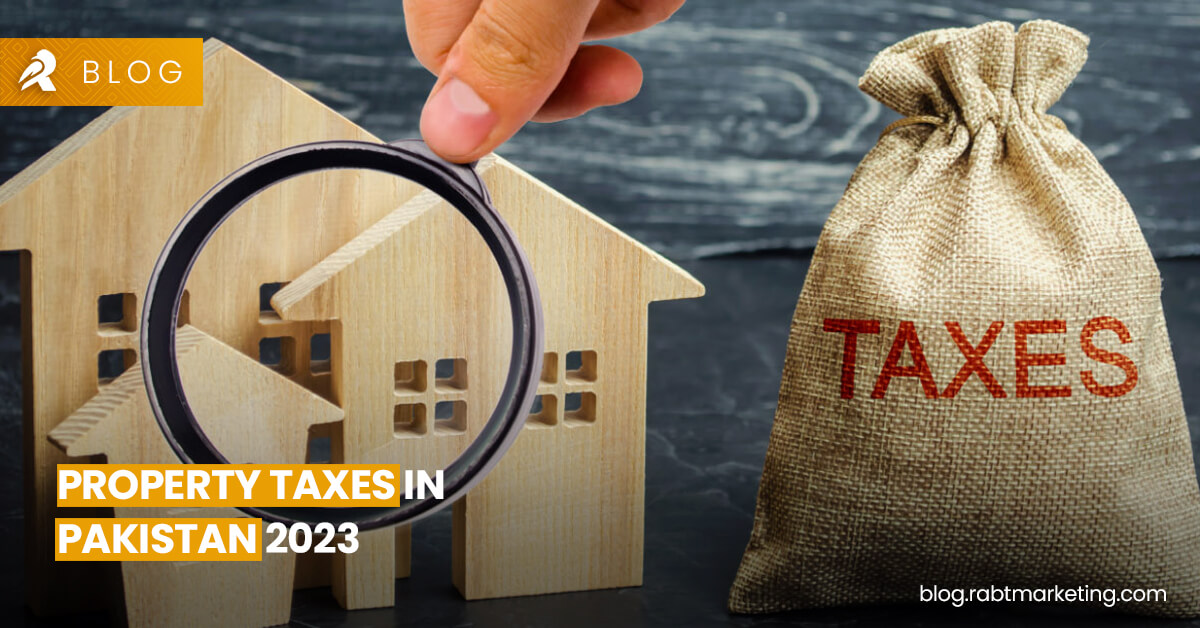Property tax plays a crucial role in the prosperity and development of any country, including Pakistan. It is a topic that requires attention and action from all citizens. As responsible citizens, paying property tax should be our priority. It is not only a legal obligation but also a contribution to Pakistan’s economic growth and development. Hiding properties or evading taxes is considered a crime and undermines the country’s progress.
Unfortunately, many individuals still choose to avoid paying their property taxes, which creates a significant problem for the country’s economy. Among many other reasons, lack of awareness is why some individuals fail to pay property taxes. They may not be aware of the exact amount they owe or how to check property tax online. In this blog, we aim to raise awareness about property taxes in Pakistan, how property tax is calculated, and provide information on property taxes in Pakistan and their types.
What is Property Tax?
Property tax is a tax IMPOSED on properties that are rented, sold, or purchased. It serves as financial support for the government and is usually calculated as a percentage of the property’s value. Property tax is not limited to residential houses; it also applies to plots, apartments, office buildings, farms, and other types of real estate.
How is Property Tax Calculated?

Property tax calculation begins with the assessment of the property’s value. Assessors evaluate various factors such as location, size, condition, and improvements made to the property. This assessment helps determine the property’s market value or assessed value, which serves as the basis for tax calculation.
Several factors influence property value, including the local real estate market, economic conditions, neighborhood desirability, and property characteristics. These factors are considered during the assessment process and can impact the property tax amount.
The assessed value is multiplied by the mill rate to calculate property tax. The mill rate is the tax rate per thousand dollars of assessed value. The resulting amount is the tax liability. The total tax levy is the sum of individual property taxes collected within a jurisdiction, supporting the local government’s budgetary requirements.
This gives us the amount of tax that needs to be paid. The total tax collected from all properties in an area is called the tax levy. This money helps the local government meet its budget needs.
Property Taxes in Pakistan

Property taxes are levied on real estate properties such as land, houses, commercial buildings, and apartments. The government collects these taxes at different levels, including federal, provincial, and local authorities. The revenue generated from property taxes is used to fund various public services, including education, healthcare, infrastructure development, and maintenance.
In 2022, the Finance Act introduced a reduction in the capital gain tax (CGT) on property in Pakistan. This reduction was implemented due to the destruction of immovable assets. The CGT is applicable when a property is sold within a holding period of less than four years. The shorter the holding period, the higher the CGT earned and the corresponding tax rate.
The CGT rates for different holding periods are as follows:
- Holding period of 1 year: 75% of CGT is applicable.
- Holding period of 2 to 3 years: 50% of CGT is applicable.
- Holding period of less than 1 year: 100% of CGT is applicable.
- Holding period of more than 4 years: No CGT is charged.
It is essential to stay updated with Pakistan’s current property tax rates. In 2023, new amendments were introduced to facilitate non-residents. The Tax Laws Ordinance 2021 brought changes to various taxes, including property taxes. These changes include a 4% super tax on banks, an engine capacity vehicle withholding tax increase, and tax rate adjustments for property sales based on profits earned.
Types of Property Taxes in Pakistan
Property taxes in Pakistan can be categorized into four main types:
Capital Value Tax (CVT)
Capital Value Tax in Pakistan refers to a tax levied on exchanging or selling immovable assets like land, buildings, or houses. The Federal Board of Revenue (FBR) determines the tax rate, which can vary depending on the nature and worth of the property involved.
As per the Federal Act of 2006, the Capital Value Tax rate in Pakistan stands at 2% of the property’s value at the time of the purchase agreement. However, some individuals opt to avoid paying the full tax amount by declaring the property’s DC rate (the rate assigned by the government) instead of its actual market value. Through this undervaluation, individuals can minimize their Capital Value tax burden.
Capital Gain Tax (CGT)
CGT is imposed on the profit earned from selling an investment, such as stocks, bonds, jewelry, coins, or real estate. The tax is applicable only when the investment is sold and realized gains are generated. The CGT rates vary based on the value of the gains.
In the Budget for the year 2023-24, the government has revised the Capital gain tax rates and its implications for all three sectors of the real estate industry. The new Capital gain tax rates are as follows:
- 5% for the Plots and Files sector.
- 10% for the Construction Sector.
- 15% for High Rise Apartments.
For Plots/files, Capital Gain Tax will only be applicable if the property is sold within 6 years. After the 6th year, the property is exempt from Capital Gain Tax. The tax rate varies depending on the duration of property ownership:
- 15% for a holding period of less than 1 year.
- 12.5% for a holding period of 1-2 years.
- 10% for a holding period of 2-3 years.
- 7.5% for a holding period of 3-4 years.
- 5% for a holding period of 4-5 years.
- 2.5% for a holding period of 5-6 years.
No Capital Gain Tax will be applied if the property is held for more than 6 years.
Also, Read Our Blog Post: How to Invest in Real Estate in Pakistan?
Withholding Tax
Withholding tax is deducted or collected at the point of origin, usually as an advance tax payment. It applies to buyers and sellers of real estate. The rates may vary depending on factors such as income tax filing status and property value.
The government has made changes to the withholding tax rates for all three sectors of the real estate industry. These revised rates will be effective from July 1, 2023, and are as follows:
- 1% for the Plots and Files Sector.
- 1.5% for the Construction Sector.
- 2% for High Rise Apartments.
Impact of the 2023-24 Budget on the Real Estate Sector
The real estate sector has been significantly affected by the 2023-24 budget recently announced by the Pakistani government. The Budget brings about various changes to the property tax system, including a higher tax rate for commercial properties and the introduction of a new tax bracket for properties valued over PKR 50 Million.
The purpose of increasing the tax rates is to establish a fair and transparent taxation system that aligns with the country’s fiscal goals. These modifications are expected to boost the revenue generated from property tax and provide a stimulus to the real estate sector.
The impact of the revised withholding tax rates on the real estate sector can differ based on several factors. Here are some potential outcomes:
Decreased demand: The higher withholding tax rates for both filers and non-filers may lead to a decline in the demand for real estate transactions. The increased tax burden could discourage potential buyers, particularly non-filers, from investing in properties.
Effect on property prices: The raised tax rates could exert downward pressure on property prices. Sellers might need to adjust their pricing strategies to attract buyers who are now subject to higher withholding tax rates. Consequently, this could result in a slowdown in the real estate market.
Increased tax revenue: Higher withholding tax rates aim to increase the government’s tax revenue. If successful, the increased tax collections could contribute to government funds for various developmental initiatives.
Change in buyer behavior: Buyers may prefer to engage with filers instead of non-filers due to the lower tax rates applicable to filers. This preference could impact market dynamics and potentially reduce transactions involving non-filers.
Compliance and documentation: The revised rates may encourage non-filers to become filers in order to benefit from the lower withholding tax rates. This shift could lead to increased tax compliance and a greater emphasis on proper documentation of real estate transactions.
Payment via e-pay
To simplify the tax payment process, the government of Pakistan has launched the e-pay app. This app enables taxpayers to make hassle-free payments. By downloading the app and following a few simple steps, individuals can fulfill their tax obligations conveniently.
Conclusion
Paying property taxes is not just a legal obligation but also a civic duty that contributes to the growth and development of Pakistan. By understanding the importance of property tax and staying informed about the current rates and regulations, we can fulfill our responsibilities as responsible citizens. It is crucial to utilize the available resources, such as the property tax calculator and online verification services, to ensure accurate tax calculations. Let us all contribute to a prosperous and thriving Pakistan by fulfilling our property tax obligations.

